The 6 best LGBTQ films of 2018
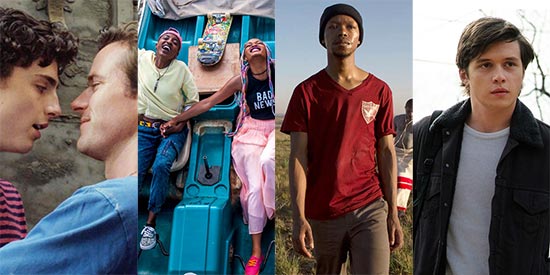
The past year gave us some truly important and outstanding LGBTQ films, not only acclaimed for their artistic value but also their social and cultural impact.
While there were other films that made a splash internationally, our list only includes those released or screened in South Africa in 2018. We also have to acknowledge that most queer movies that get a wide release tend to be about gay men. We’d love to see a more varied representation of the LGBTQ community.
Having said that, here are our 6 favourite LGBTQ films of 2018.
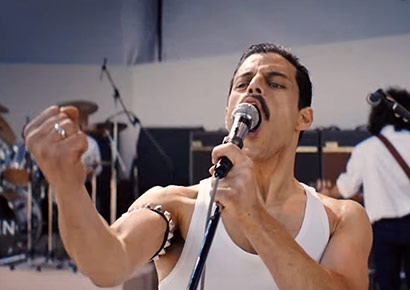 No 6. BOHEMIAN RHAPSODY
No 6. BOHEMIAN RHAPSODY
Some argue that this biopic of Freddie Mercury and his iconic band Queen is not really a queer film because of its alleged “straightwashing”.
We disagree. The film, after all, is about one of the world’s most famous queer music icons and was predominantly directed by a gay man, Bryan Singer (who admittedly left the production under a cloud of rumours after shooting most of it.) Let’s not forget that Mercury never came out during his lifetime and was neither a public champion of the LGBTQ community nor of people living with HIV. He nevertheless remains a much-loved performer around the world.
The film clearly aimed to appeal to Queen’s mainstream popularity, and in that it it succeeded. Bohemian Rhapsody has gone on to become the most successful film about a queer person at the box-office; earning $669 million to date.
It has many faults, such as bizarrely rearranging the order of events in Mercury’s life for dramatic effect, and it also lacks character depth. What we are left with is a somewhat superficial but foot-stomping, entertaining and accessible tribute to Queen’s musical genius that does not gloss over Mercury’s sexuality.
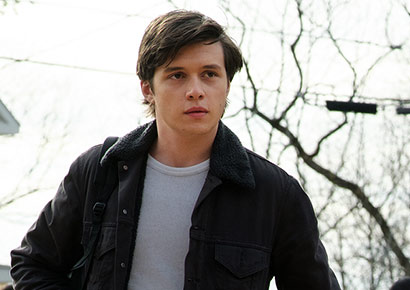 No 5. LOVE, SIMON
No 5. LOVE, SIMON
Like Bohemian Rhapsody, Love, Simon (read our review here) was carefully crafted to appeal to a wide audience, not just a queer film festival crowd.
The romantic-comedy-drama is about a gay American teenager, Simon Spier (Nick Robinson), who is still in the closet to his family and friends. After he falls in love with an online stranger, a schoolmate threatens to out him to the school, putting Simon in an uncomfortable dilemma.
This a heartwarming, feel good film that emulates all the conventions of the American high school movie, but with a gay lead character. Its predictability doesn’t diminish the emotional journey that Simon embarks on in any way. We were deeply moved and so were the diverse audience members we watched it with.
Love, Simon is in many ways formulaic and ‘safe’ but is also funny and engaging. It’s a great film to watch with your parents or family, giving them an insight into growing up feeling different and queer.
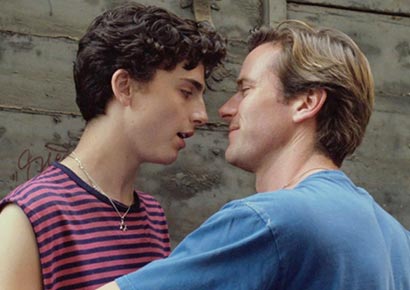
No 4. CALL ME BY YOUR NAME
Luca Guadagnino’s Call Me By Your Name (read our review here) is probably the most beautiful film on our list, thanks to its stunning Italian countryside setting, sensual cinematography and cast.
Based on the novel by Andre Aciman, it is a coming of age story about gifted 17-year-old Elio (Timothée Chalamet), who’s spending the summer of 1983 in Italy with his parents. They are joined by the handsome Oliver (Armie Hammer), a 24-year-old American student who’s come to work with Elio’s father. Soon enough erotic tensions rise to the fore and Elio and Oliver grapple with their growing attraction for one another.
The film came under fire by some for its depiction of a love affair between a 17-year-old boy and an older man. Call Me By Your Name, however, is never exploitative and its sincerity and humanity shine through.
It received four Oscar nominations, but ultimately only won one; Adapted Screenplay for James Ivory. The performances are immaculate, and the film powerfully evokes the universal stirrings of young first love. Call Me By Your Name is a slow burn movie that truly delivers.
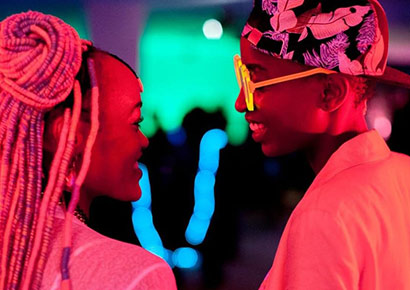 No 3. RAFIKI
No 3. RAFIKI
Rafiki is another example of an intimate and modest film that has an unexpectedly momentous impact on society.
A South African co-production directed by Kenyan Wanuri Kahiu, Rafiki is based on the award-winning short story Jambula Tree, by Monica Arac de Nyeko. It is a coming of age tale about two Kenyan girls who fall in love and whose desire for each other flies in the face of African conventions.
It first registered on our radar when it was invited to premiere at the Cannes Film Festival in May, a historic moment for the Kenyan film industry. Instead of celebration back home, however, it was met with a ban by the Kenyan Film and Classification Board (KFCB) due to its “clear intent to promote lesbianism in Kenya contrary to the law.”
Kahiu took the KFCB to court and scored a partial but important victory, overturning the ban for a week, allowing Rafiki to be screened in cinemas and to break box office records. Thanks to the attempt to clamp down on freedom of expression and the resulting headlines, this lesbian love story was likely seen by a much larger audience than expected.
Rafiki is a lovely film, but it will likely be most remembered for its positive depiction of African queerness and for challenging restrictions on civil liberties in a country that still jails people because of who they love.
Sadly, Rafiki has not been officially released in South African cinemas but was screened at film festivals in Durban, Cape Town and Johannesburg.
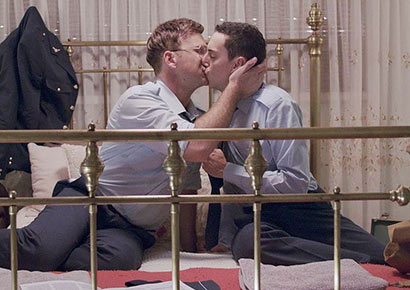 No 2. KANARIE
No 2. KANARIE
Released in October, Kanarie (read our review here) was an artistic triumph for the South African and particularly the Afrikaans film industry.
Set in the 1980s, small town 18-year-old schoolboy Johan Niemand (Schalk Bezuidenhout) is called up for compulsory military service to defend the “Vaderland” from the “communists”. Hoping to avoid the most stifling aspects of the army, he auditions and is accepted to the South African Defence Force Choir, called the ‘Canaries’.
When Johan discovers that he has growing feelings for a fellow choir member, he begins to question everything about himself and his world; his religion, patriotism, sexuality and the realities and truth of South Africa.
It is a heartfelt coming of age story located within the political, social and cultural turmoil of the dying days of the apartheid state. Kanarie depicts the experiences of many white South Africans who lived during the fear and paranoia of the 1980s, but it is also a universal story about being different, asking questions and trying to figure out who you are and where you belong.
Kanarie boasts an engaging cast of characters, great musical moments and a mix of humour and dramatic set pieces. Like our next film, it also explores the oppression and destructive nature of toxic masculinity.
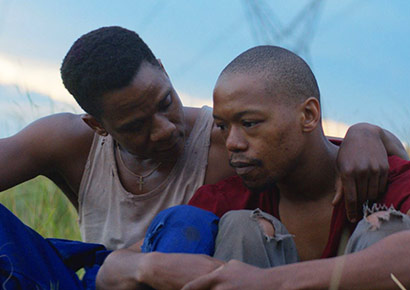 No 1. INXEBA (THE WOUND)
No 1. INXEBA (THE WOUND)
This was the film that ’caused all the trouble’. Who knew that an acclaimed but small independent movie could lead to months of unprecedented controversy in South Africa.
After winning multiple film festival awards around the world, Inxeba (read our review here) was released locally in February, to stunning effect. Directed by John Trengove, Inxeba is the story of Xolani, a lonely closeted Xhosa factory worker who joins the men of his community in the mountains of the Eastern Cape to initiate a group of teenage boys into manhood. There, he confronts the man he has secretly loved for years.
There were immediately calls from traditional leaders to have the film banned, apparently for its depiction of sacred Xhosa initiation rituals. Many, however, believe the attempt to censor Inxeba was for another reason: homophobia – thanks to the film’s depiction of same-sex love in a deeply patriarchal and exclusively masculine enclave. There were protests, threats, canceled screenings and a bid by the Film and Publications Appeals Tribunal to effectively ban it. This was thankfully overturned and probably many more people ended-up watching Inxeba because of the controversy surrounding it. And that’s a very good thing.
The film opened up much needed debates on cultural values vs constitutional values, modernity vs tradition, patriarchal masculinity vs queerness and so much more. Stripped of its culture shock (if that is really possible), it is a fantastic film in terms of its impressive direction, performances and cinematography. Inxeba is a film every South African should see and is deservedly our top LGBTQ film of 2018.
- Facebook Messenger
- Total227
What about “God’s own country”?
Apologies that was 2017